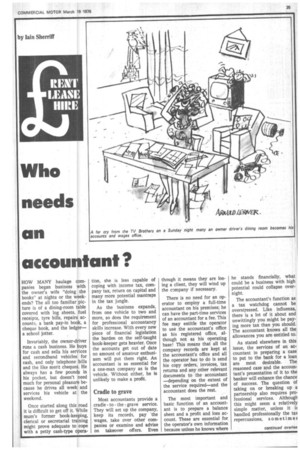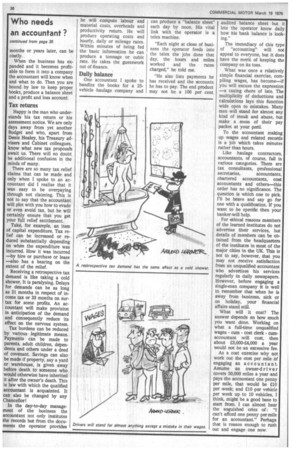Who needs an accountant?
Page 37

Page 38

Page 39

If you've noticed an error in this article please click here to report it so we can fix it.
HOW MANY haulage companies began business with the owner's wife "doing the books" at nights or the weekends? The all too familiar picture is of a dining-room table covered with log sheets, fuel receipts, tyre bills, repairs accounts, a bank pay-in book, a cheque book, and the ledger— a school jotter.
Invariably, the owner-driver runs a cash business. He buys for cash and sells his services and secondhand vehicles for cash, and only telephone bills and the like merit cheques. He always has a few pounds in his pocket, but doesn't need much for personal pleasure because he drives all week and services his vehicle at the weekend.
Once started along this road it is difficult to get off it. While mum's former book-keeping, clerical or secretarial training might prove adequate to cope with a petty cash-type opera tion, she is less capable of coping with income tax, company tax, return on capital and many more potential mantraps in the tax jungle.
As the business expands, from one vehicle to two and more, so does the requirement for professional accountancy skills increase. With every new piece of financial legislation the burden on the self-taught book-keeper gets heavier. Once the accounts get out of date no amount of amateur enthusiasm will put them right. An accountant is as essential for a one-man company as is the vehicle. Without either, he is unlikely to make a profit.
Cradle to grave
Most accountants provide a cradle tothe grave service. They will set up the company, keep its records, pay 'the wages, take over other companies or examine and advise on takeover offers. Even though it means they are losing a client, they will wind up the company if necessary.
There is no need for an operator to employ a full-time accountant on his premises; he can have the part-time services of an accountant for a fee. This fee may entitle the operator to use the accountant's office as his registered office, although not as his operating base! This means that all the company records are kept at the accountant's office and all the operator has to do is send his copy orders, invoices, tax returns and any other relevant documents to the• accountant —depending on the extent of the service required—and the accountant does the rest.
The most important and basic function of an accountant is to prepare a balance sheet and a profit and loss account. These are essential for the operator's own information because unless he knows where he stands financially, what could be a business with high potential could collapse overnight.
The accountant's function as a tax watchdog cannot be overstressed. Like influenza, there is a lot of it about and unwittingly you might be paying more tax than you should. The accountant knows all the allowances you are entitled to.
As stated elsewhere in this issue, the services of an accountant in preparing a case to put to the bank for a loan are most desirable. The reasoned case and the accountant's presentation of it to the banker will enhance the chance of success. The question of taking on or breaking up a partnership also requires professional services. Although this might seem a relatively simple matter, unless it is handled professionally the tax repercussions, sometimes months or years later, can be costly., When the business has expanded and it becomes profitable to form it into a company the accountant will know when and what to do. Then you are bound by law to keep proper books, produce a balance sheet and a profit and loss account.
Tax returns
Happy is the man who understands his tax return or his assessment notice. We are only days away from yet another Budget and who, apart from Denis Healey, his Treasury advisers and Cabinet colleagues, know what new tax proposes await us. There will no doubt be additional confusion in the minds of many.
There are so many tax relief claims that can be made and only when I spoke to an accountant did I realise that it was easy to be overpaying through not claiming, This is not to say that the accountant will plot with you how to evade or even avoid tax, but he will certainly ensure that you get your full relief entitlement.
Take, for example, an item of capital expenditure. Tax relief can be increased or reduced substantially depending on when the expenditure was incurred. How it was incurred —by hire or purchase or lease --also has a bearing on the extent of the relief.
Receiving a retrospective tax demand is like taking a cold shower. It is paralysing. Delays for demands can be as long as 21 months in respect of income tax or 33 months on surtax for some profits. An accountant will make provision in anticipation of the demand and consequently reduce its effect on the nervous system.
Tax burdens can be reduced by various legitimate means. Payments can be made to parents, adult children, dePendents and others under a deed of covenant. Savings can also be made if property, say a yard or warehouse, is given away before death to someone who would otherwise have inherited it after the owner's death. This is law with which the qualified accountant is acquainted. It can also be changed by any Chancellor!
In the day-to-day management of the business the accountant not only institutes the records but from the documents the operator provides he will compute labour and material costs, overheads and productivity return. He will produce operating costs and hourly, daily or mileage rates. Within minutes of being fed the basic information he can produce a tonnage or cubic rate. He takes the guesswork out of finance.
Daily balance
One accountant I spoke to handles the books for a 25vehicle haulage company and can produce a "balance sheet" each day by noon. His vital link with the operator is a telex machine.
"Each night at close of business the operator feeds into the telex the jobs done that day, the hours and miles worked and the rates charged," he told me.
"He also lists payments he has received and the accounts he has to pay. The end product may not be a 100 per cent audited balance sheet but it lets the operator know daily how his hank balance is looking."
The immediacy of this type of "accounting" will not appeal to everyone, but it does have the merit of keeping the company on its toes.
What was once a relatively simple .financial exercise, com piling wages, has become—if you will excuse the expression —a taxing ohore of late. The multiplicity of deductions and calculations lays this function wide open to mistakes. Many men will stand for almost any kind of insult and abuse, but make a mess of their pay packet at your peril.
To the accountant making up wages and related records is a job which takes minutes rather than hours.
Like haulage contractors, accountants, of course, fall in various categories. There are tax consultants, professional secretaries, accountants, chartered accountants, cost accountants and others—this order has no significance. The question is which one to pick. I'll be brave and say go for one with a qualification. If you want to be specific then your banker will help.
For ethical reasons members of the learned institutes do not advertise their services, but details of members can be obtained from the headquarters of the institutes in most of the major cities 'in the UK. This is not to say, however, that you may not receive satisfaction from an unqualified accountant who advertises his services regularly in daily newspapers. However, before engaging a single-man company it is well to remember that when he is away from business, sick or on holiday, your financial affairs stand still.
W:hat will it cost? The answer depends on how much you want .done. Working on what a full-time unqualified wages cum cost clerk cumaccountant will cost, then about £3,000-£4,000 a year would not be an excessive fee.
As a cost exercise why not work out the cost per mile of engaging an accountant. Assume an owner-d river covers 50,000 miles a year and pays the accountant one penny per mile, that would be £10 per week; and £10 per vehicle per week up to 10 vehicles, I think, might be a good base to start from. I can almost hear the anguished cries of : "I can't afford one penny per mile for an accountant." Perhaps that is reason enough to rush out and engage one now. Hex Lucking is Distribution Director of Canada Dry. Six months ago they took two Rentco curtain-sided vehicles on rental to find out if they suited their needs better than Flats for the 'non-returnable' side of their business. The experiment was a success and they have now taken delivery of three more on Contract Hire, modified to their own spec. and in Canada Dry livery. But listen to Mr. Lucking ... "When we decided to test Curtainsided vehicles against our existing Flats, rental vvasthe obvious answer. Outright purchase could have been an expensive way of maybe proving nothing. The deal that Rentco set up allowed us ample time for proper evaluation, and when it became apparent that we were winning they were flexible enough to allow us to switch into a longer term Contract Hire. That we have now taken on three more vehicles from Rentco is in itself proof that we are more than satisfied with the way things are going. What impresses me most about Rentco is the fact that they obviously know transport extremely well and are genuinely concerned to give a customer what he needs. You never get the feeling that you are being 'pushed'. Certainly !would not hesitate to recommend Rentco " In today's world of financial uncertainty, more and more companies are realising that Trailer Rental and Contract Hire make good sense and more and more are choosing Rentco. Just look what Rentco has to offer, and then fill in the coupon to find out how Rentco can help you. * Dependable service * Nationwide coverage *All types of semi-trailers available * All Crane Fruehauf semi-trailers * No 'hidden' extras * Complete flexibility *Your own livery on Contract Hire * Special short-term rental rates for Contract Hire customers * Competitive rates








































































































